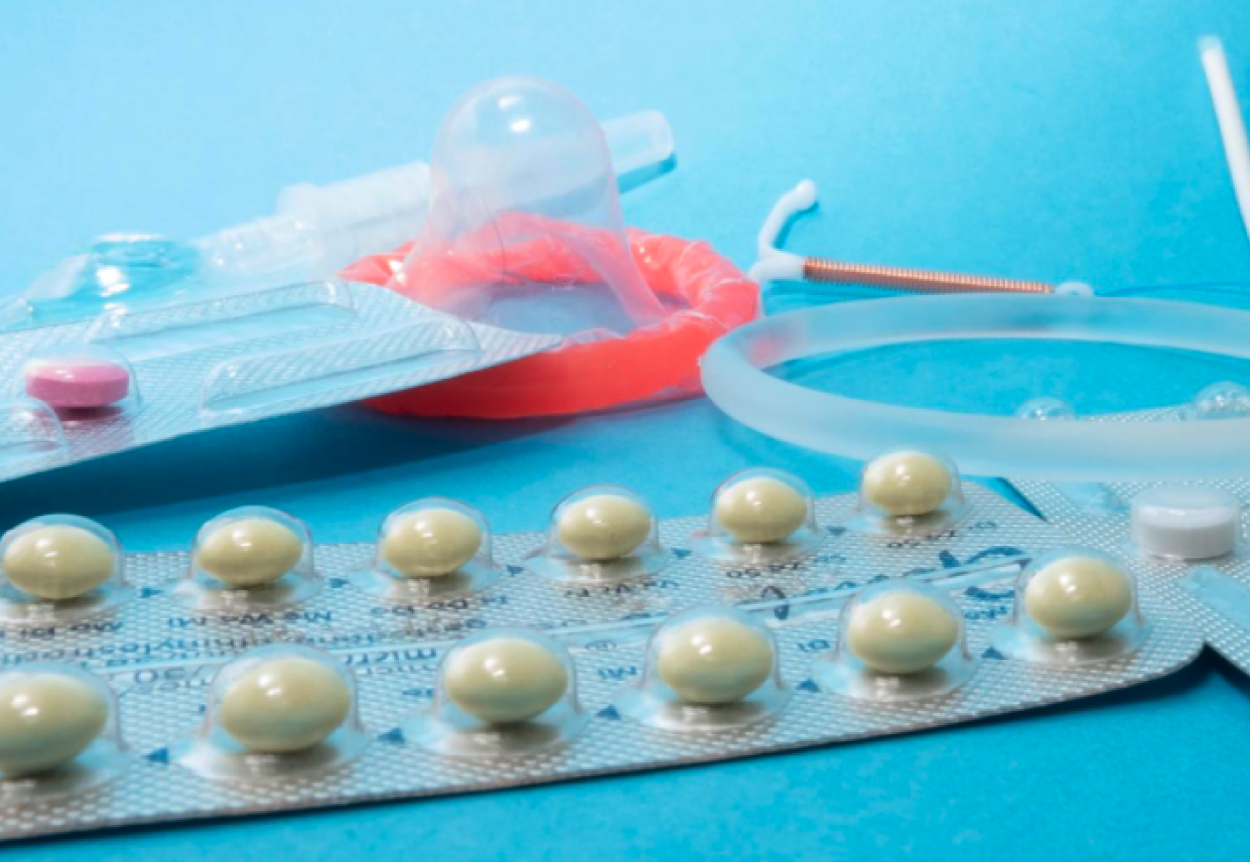
Frequently Asked Questions
Nope, your chance of getting pregnant is the same whether you've been on your birth control for 2 weeks or 2 years. While you don't mention the method you use, with most methods you are able to get pregnant as soon as you stop using it—which is why it's important to use birth control consistently. While having no period is a common side effect for some birth control, it doesn't mean you are any less fertile should you stop using your method.
Great question, you can have an IUD inserted even if you have never had sex. This is a great discussion to have with your health care provider though to make sure that it's the best type of birth control for you!
Yes. Any time you have sex, there’s a chance that you can get pregnant. If the condom broke, even if you didn’t feel anything, sperm may have still entered the vagina. If you think you might be pregnant—or if your period is late—be sure to take a pregnancy test or contact a health care professional who can give you one. If it’s early enough after the condom broke, you might be able to use emergency contraception as a backup; emergency contraception or EC is a method of birth control that stops pregnancy from happening. It’s not meant to be used as your primary method of birth control—hence the name emergency contraception—but we all know that accidents (like the condom breaking) happen, so it's best to know about this method before you need it.
There’s no age limit for buying condoms! It’s normal to be a little bit nervous when you’re buying condoms for the first time, but it’s super important to be protected if you decide to have sex. If you want to avoid coming face to face with a cashier, try to go somewhere with a self-checkout counter.
Yes but... you're only covered if you took the first three weeks of pills right. That means you took all 21 pills, one a day, at the same time every day. That's because the pill works by releasing hormones that prevent your ovaries from releasing eggs. The hormones also thicken your cervical mucus, which helps to block sperm from getting to the egg in the first place. Remember that the pill doesn't protect you from STIs. It’s a good idea to double up your hormonal birth control method by using condoms too.
It's your call. If you're not currently sexually active but want to be prepared for the future then getting on birth control is a great idea. Some people also use birth control to lessen period symptoms such as cramping or to make sure they always know when their period is going to come. Make an appointment with your health care provider to discuss which option will work best for you and to get a prescription.
A broken condom is usually a noticeable rip or tear, there shouldn't be any tiny holes unless someone has intentionally damaged them.
When condoms break, it’s usually because:
Space for semen wasn’t left at the tip of the condom
The condoms are out-of-date
The condoms have been exposed to heat or sunlight
The condoms have been torn by teeth or fingernails
If the condom broke, even if you didn’t feel anything, sperm may have still entered the vagina. If you think you might be pregnant—or if your period is late—be sure to take a pregnancy test or contact a health care professional who can give you one. If it’s early enough after the condom broke, you can use emergency contraception as a backup; emergency contraception or EC is a method of birth control that stops pregnancy from happening. It’s not meant to be used as your primary method of birth control—but we all know that accidents (like the condom breaking) happen, so it's best to know about this method before you need it.
There are several methods you can use if you never want to have another period. They are:
- Hormonal IUDs. About 1 in 5 people using the Mirena or LILETTA IUDs had their periods stop altogether after a year. A Washington University in St. Louis study found women with light and normal bleeding were most likely to stop bleeding altogether, and those with light (21%) and normal (16%) flows reported no periods in the last six months.
- The Shot. Depo-Provera injections may lessen the intensity of your menstrual cramps and period, or they might go away altogether. However, a common side effect of the shot is irregular bleeding for the first six to 12 months of use. This can mean longer or heavier periods or spotting in between periods.
- The Implant. Some people get no periods at all (at least for a while) using this method. However, like the shot, irregular bleeding for the first six to 12 months is common, and some folks have irregular bleeding the whole time the implant is in.
It doesn’t matter for most methods, including the IUD, the implant, the shot, the ring, and condoms. These methods are all effective for people of any weight. But we don’t know for sure whether weight matters for the commonly used pill, or for the patch.
Yes! Hormonal birth control can help alleviate the depression symptoms associated with conditions such as premenstrual syndrome (PMS) and premenstrual dysphoric disorder (PMDD). For many people, birth control helps to manage and even improve their moods.
Using menstrual cups and tampons with either an IUD or the ring is safe and shouldn’t interfere with the effectiveness of your birth control. There is a small risk of expulsion with an IUD, but the rate of this happening to a cup user is no higher than for folks who use other menstrual products. If you are careful around the strings of the IUD and avoid suction when removing a cup, there should be no problem. As far as the ring goes, if you pull it out, just rinse it and put it back.
Yes! But here are some things to talk about with your health care provider:
Heart health. People with diabetes, especially type 2, are at a greater risk for cardiovascular issues. Some birth control methods also slightly increase your risk for those problems, so your provider may want to talk to you about your heart health when helping you pick out a birth control method.
Hormones and your blood sugar. Some hormonal birth control methods can raise your blood sugar.
Infections.People with diabetes are more prone to infections than people without diabetes, including pelvic infections. If you choose an IUD, avoiding pelvic infections is important. Use a condom every time you have sex, and consider using lube, too. Diabetes can sometimes lead to vaginal dryness, causing skin ruptures in and around your vagina which can get infected. Lube can help you avoid that. Plus, it can make sex feel even better!
Three of the most common forms of birth control—the pill, the ring, and the patch—all work the same way. They’re all considered “combined” hormonal methods, meaning they contain two kinds of hormones: estrogen and progestin. Other hormonal methods—the shot, the implant, hormonal IUDs, and the progestin-only pill (a.k.a., minipill)—contain only one kind of hormone—a progestin.
If your partner pulls out perfectly every single time, then withdrawal is about 96% effective. This is a hard method to get perfect, though, so it’s more likely that withdrawal will be around 78% effective.
Of those women who use withdrawal exactly as directed, about 4 in 100 will experience an accidental pregnancy during the first year they use this method.
Of those women who do not use withdrawal exactly as directed, about 22 in 100 will experience an accidental pregnancy during the first year they use this method.
Yes! Any time that you have sex—even during your period—there’s a chance you’ll get pregnant, especially if you’re having unprotected sex. You’re most likely to get pregnant around the time of ovulation (when an egg is released from the ovary), but is possible to get pregnant at any time during your cycle. Many women have irregular period cycles or unpredictable ovulation, and it’s especially common for teens to have irregular cycles. Plus, sperm can stay alive and swimming in the body for days after sex.
If you’re having sex, your best bet is to use birth control—ideally, use a hormonal method and a condom (to help prevent STIs as well as pregnancy). There’s a ton of birth control methods out there, so check our Birth Control Methods to find one that works best for you.
Being drunk won't make you pregnant by itself, but it may lead to you making more risky decisions than you would when you were sober; decisions like having unprotected sex. If you use birth control, it can protect you from unplanned pregnancy. There’s a ton of birth control methods out there, so check out our Birth Control Methods to learn more. It’s a good idea to double up with a hormonal birth control method plus condoms, so you’re protected against STIs too.
Yes! If there is ejaculate inside the vagina, pregnancy is possible.
Sperm can live inside you for anywhere from 2 to 5 days after you have sex and it's hard to know when exactly you are ovulating because it doesn't happen at the exact same time every month. Likewise, even if it was just the tip or he didn’t ejaculate, there may be sperm in pre-cum.
So while the probabilities of getting pregnant may be low, the possibilities are there. Better safe than sorry, so be prepared ahead of time with birth control. Use our Birth Control Methods to learn more about all the methods available to you. It’s a great idea to use a birth control method along with condoms, so you’re protected against pregnancy and STIs.
Yes, it’s absolutely safe to take two pills in one day, including taking two pills at once. That said, the most effective and best way to take your birth control pill is to take one every day (and if you’re taking the mini-pill, it’s extra important to take it at the same time every day). Regularly taking more than one pill a day won’t make your birth control more effective.
However, if you miss a pill, take it as soon as you remember, even if that means it’s at the same time as your next regularly scheduled dose. You might feel nauseated if you have to do this, especially if you need to take two pills at once, so take your pills with food.
Pregnancy happens when a man's sperm meets with a woman's egg. If you're not engaging in any behavior that would result in that then nope, you can't get pregnant from just touching!
Absolutely, especially if it’s unprotected sex. All sex is created equal, so it doesn’t matter if it’s your first time or 31st time—you still have the same chance of getting pregnant, that’s why it’s super important to use protection. To understand all of the birth control options available to you, check out our Birth Control Methods or ask your doctor.
For those who still have their uterus and ovaries (where eggs are made) you can get pregnant if you’re having sex with someone who has a penis and testicles.
Many trans men use testosterone (T). For most, T stops their monthly period, but that doesn’t mean they can’t get pregnant. How is that possible? Well, testosterone doesn’t completely stop egg production, so some guys will still release eggs even on T and even without a period.
For those who still have their penis and testicles—if your partner has a uterus and ovaries, you can get them pregnant. Many trans women think that if they are on estrogen they can’t get another person pregnant. Not true. Though it may be harder to get an erection, make sperm, and ejaculate when you are on estrogen, it’s not impossible.
If you are trans or you are in a relationship with a trans person and you do not want to get pregnant, birth control is something to consider.
Most methods will not cause weight gain. Many young women are starting birth control for the first time while their body is going through many other changes. Some women gain weight naturally when transitioning from their teens into their twenties. If that happens to be when a woman starts birth control, it’s easy to put the blame on the pill, patch, the implant, the hormonal IUD, or ring. The truth is each of these methods can be used without an expected weight gain. A recent study showed about 1 in 4 women who use the shot will gain some weight. However, most women (3 out of 4) don’t gain much weight. So, most women using the shot are able to keep their weight steady with healthy eating and regular exercise.
Using a method of birth control with estrogen increases a young woman’s risk of forming a blood clot by several times, but for women who have no history of stroke, blood clots, or heart attack, and whose family members have never experienced a blood clot, the risk is still quite low. Women with a history of these medical conditions in their family have a higher risk of forming a new blood clot; adding birth control with estrogen to the mix increases that risk to an unacceptable level.
Progestin-only methods like the implant, mini-pill, the shot, and Skyla and Mirena IUDs don’t increase your risk. If you’re worried about blood clots, we recommend talking to your health care provider about which birth control options are best for you.
If you feel like your birth control is changing your behavior, it’s time to talk to your health care provider. Everybody responds to birth control differently, and your provider can help you decide whether it’s time to try something else. It might be a matter of switching hormonal methods or deciding whether to avoid hormonal birth control altogether, or you may choose to wait it out since some negative side effects go away with time. The bottom line: If your current method is making you feel blah, don’t settle. There are a lot of methods to choose from and sometimes it can take a few tries to get it right.
Yes, orgasms feel great, but they don’t actually affect your chances of getting pregnant. If you have unprotected sex and your partner ejaculates you can get pregnant, whether or not you had an orgasm.
No, douching does not prevent pregnancy. If you’ve had unprotected sex within the last five days, you can get emergency contraception to help prevent a possible pregnancy.
Lots of people think that because they haven’t gotten pregnant yet, that means they can’t get pregnant, but that’s not the case. The chances that you can’t get pregnant are actually pretty low. Nine out of 10 people will get pregnant within a year if they’re having penis-in-vagina sex and not using any form of birth control.
When the pill was first developed in the 1960s, it contained around twice the dose of estrogen that today’s pills do. Studies of women who used pills before 1975—when those older, higher-dose versions were around—showed a slight increased risk of breast cancer, and these older studies are why the World Health Organization listed the pill as a carcinogen. Today, it’s extremely rare for these higher-dose versions of the pill to be used at all, especially on a long-term basis. (FYI, there are only two brands of pills still sold in the U.S. with the higher dose of estrogen, Ovral and Ogestrel, each containing 50 micrograms of ethinyl estradiol.)
The pills that your health care provider would prescribe to you today have much lower levels of estrogen (between 20 and 35 micrograms of ethinyl estradiol), making them a lot safer. Many studies have looked at the risk of breast cancer in women who use the modern pill, and they suggest that there is no increased risk of breast cancer with pill use. Even the small percentage of women with genetic risk factors for breast cancer don’t have increased risk from using the pill.
Yes! Even if you know you have or had HPV, you probably haven’t had all the different strains. Getting the HPV vaccine can help protect you from the ones you don’t have.
All methods of birth control that aren’t permanent will help prevent pregnancy while you’re using them. But none of them change your ability to get pregnant when you stop. That’s why people who use the pill can get pregnant after missing just one pill.
Depending on your personal situation, some methods might be better suited for you than others. However, you still have options! Some methods even help treat certain health conditions.
That was in the old days! You can now start using the control pill whenever you want, wherever you are in your cycle. You might need to use a backup method for a while, depending on which method you’re starting.
HPV is spread from skin-to-skin contact, so it’s super common. Mucous membranes, like the delicate skin of the vagina, vulva, penis, anus, and throat, are more likely to get an HPV infection. Many HPV strains can be spread during oral, anal, or vaginal sex.
Getting the HPV vaccine before any sexual activity is the best way to prevent HPV infection, but if you’re under age 45 and haven’t been vaccinated (or you started the vaccination series but didn’t finish it), talk to your provider about getting it. While the vaccine won’t clear any strains of HPV you’ve already been exposed to, it will protect you from the ones you haven’t gotten yet.





